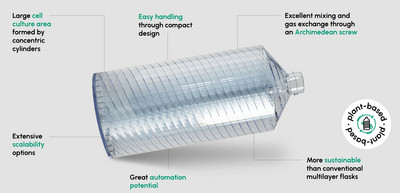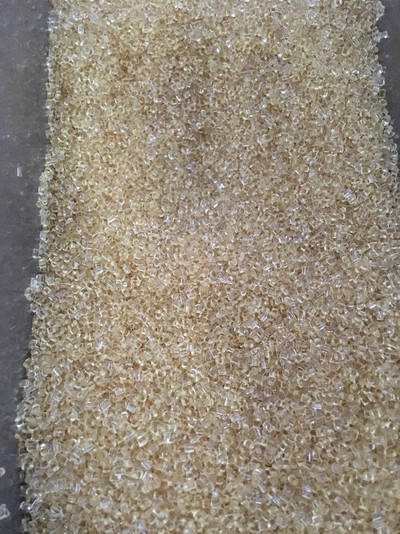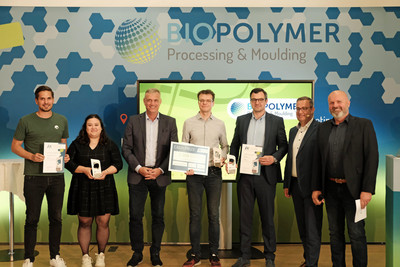BIOPOLYMER Innovation Award: Experience the winners 2023 on video!
The main Prize worth 2.000 Euros
goes to the Thuringian Institute for Textile and Plastics Research Rudolstadt (TITK) e.V. for the development of the fully bio-based and biodegradable hot melt adhesive Caremelt®. Hot glue can be found in many products today and has long since conquered the home improvement market. Up to a fifth of all adhesives today fall into this category! However, until now no fully bio-based and biodegradable hot-melt adhesive has been available on the market. This is all the more remarkable as adhesives can only very rarely be removed from products again for technical and economic reasons. Adhesives often end up in the environment as microplastics, for example due to product use and wear and tear, improper disposal or other circumstances. The researchers and developers at TITK have therefore turned to a problem whose solution is as overdue as it is technically challenging! The courage of the TITK team led by project manager Andreas Krypczyk to take on this challenge and the result impressed the jury in equal measure: once Caremelt® gets into the environment, microorganisms and natural degradation processes completely make it part of natural cycles again. In addition, as a completely bio-based adhesive, it is CO2-neutral. The properties of the adhesive and its application profile can be compared with those of established hot-melt adhesives, taking into account the somewhat lower thermal resistance. The patent-pending composition of polylactic acid (PLA), polysuccinic acid (PBS), terpene and colophony resins, natural waxes and citric acid derivatives is not only suitable for short-lived products such as shopping bags, diapers or cardboard boxes. Thanks to the new development from Thuringia, adhesive bonds in shoes, textiles, wood, metal or furniture parts and books can also be biodegradable in the future.
![[Translate to english:] Caremelt® - der biologische Schmelzklebstoff (photo: © TITK e.V.)](https://polykum.de/fileadmin/_processed_/e/6/csm_Caremelt_-_TITK_839dc09539.jpg)
© TITK e.V.
The bio-based and biodegradable hot melt adhesive Caremelt® from Rudolstadt can be processed with conventional hot glue guns, among other things. If the product ends up in the environment, the adhesive becomes part of the natural material cycle again - instead of microplastics.
The 2nd Prize
is awarded to Green Elephant GmbH from Gießen for CellScrew® - a new type of bioreactor for the propagation of adherent (i.e. growing on surfaces) cell cultures. This innovation makes the provision of living tissue, for example for gene and cell therapies or for research into cosmetics and medicines, more efficient and more comfortable. Green Elephant customers can also improve their carbon footprint for disposable laboratory material by up to 90 percent! The fact is: in addition to life-saving cells that are indispensable for research, laboratories everywhere in the world now also produce around ten million tons of plastic waste per year, and the trend is rising sharply. The team around the Green Elephant founders Felix Wollenhaupt and Joel Eichmann is now countering this trend with CellScrew®. The key is their revolutionary technology. In contrast to the cell culture flasks that have so far been made primarily from petroleum-based polystyrene, CellScrew® consists of completely bio-based PLA (polylactide). In addition, a CellScrew® system replaces up to 450 conventional cell culture flasks. This is made possible by an ingenious design that also radically simplifies handling in the laboratory: An Archimedean screw in the bottle, in combination with concentric cylinders, not only ensures continuous transport of the cell culture medium when stored on wheels, but also creates a compared to previous systems Huge internal surface - with 80 percent less material usage.
The jury was particularly enthusiastic about the consistency with which the Gießen start-up founders, who became plastics processors as career changers, took advantage of the advantages of the material. The high biocompatibility of PLA is just as important as the fact that the material can be processed excellently in 3D printing. And if CellScrew® is not recycled or composted after single use for reasons of sterility, like conventional cell culture bottles, but is burned, the bio-based material has another advantage: Unlike fossil materials, hardly more greenhouse gases are released than the plants that served as raw materials , have previously taken from our present atmosphere.

© Green Elephant GmbH
With the CellScrew® bioreactor, the start-up is revolutionizing the cultivation of living cells for medical, pharmaceutical and cosmetic purposes by consistently combining the advantages of the bioplastic polylactic acid (PLA) with an innovative design.
The 3rd Prize
goes to SoBiCo GmbH from Bad Sobernheim (Rhineland-Palatinate) for their innovation Plactid®. The brand stands for a pioneering approach to opening up numerous new fields of application for the globally popular bioplastic polylactic acid (PLA). Above all, the relatively low elongation at break, limited impact strength and the milky appearance have so far limited the range of uses for PLA. Classic attempts at modification often fail due to the complex migration and crystallization behavior of plasticizers and other additives in PLA. The team around SoBiCo Managing Director Johannes Fuchs was therefore looking for fundamentally different solutions. This is how the concept for Plactid® came about together with the Fraunhofer Institute for Applied Polymer Research (IAP) in Potsdam: a PLA copolymer family that is manufactured using a new type of process – reactive compounding. In addition to bio-based lactide, various polyols are used, which can come from biological or fossil sources, depending on the application. The PLA copolymers can be specifically adjusted from hard/brittle to soft/ductile, in many cases while maintaining biodegradability. For example, soft films with high crystallinity are possible. However, injection molding grades with a significantly higher crystallization rate and impact strength than standard PLA can also be produced. In addition, the PLA copolymers are also suitable as additives for modifying standard PLA. In addition to these future-oriented results, the jury also recognizes the endurance of the SoBiCo team, which invested seven years of research and development work until the product was ready for use.
The jury
This year's BIOPOLYMER Innovation Awards jury consisted of the following members (in alphabetical order of surnames):
Dr. Martin Bussmann, Manager Renewable Polymers and Chemicals, Neste Germany GmbH, Düsseldorf.
Simone Fischer, editor of the industry magazin „Plastverarbeiter“ („Plastics Processor“), Hüthig GmbH, Heidelberg
Dr.-Ing. Patrick Hirsch, expert of bioplastic materials at the Fraunhofer Institute for Materials and Systems (IMWS) Halle (Saale).
Peter Putsch, Chairman of POLYKUM e. V. – Association for the Promotion of Polymer Development and Plastics Technology, Merseburg.
Michael Walter, Business Development Manager, Hexpol TPE GmbH, Lichtenfels

![[Translate to english:] [Translate to english:]](https://polykum.de/fileadmin/_processed_/5/a/csm_01_BIOPOLYMER_Award_-_winners_with_moderators_on_stage_-_Foto_POLYKUM_Moritz_Geyer_2556_45b70e1f9a.jpg)

